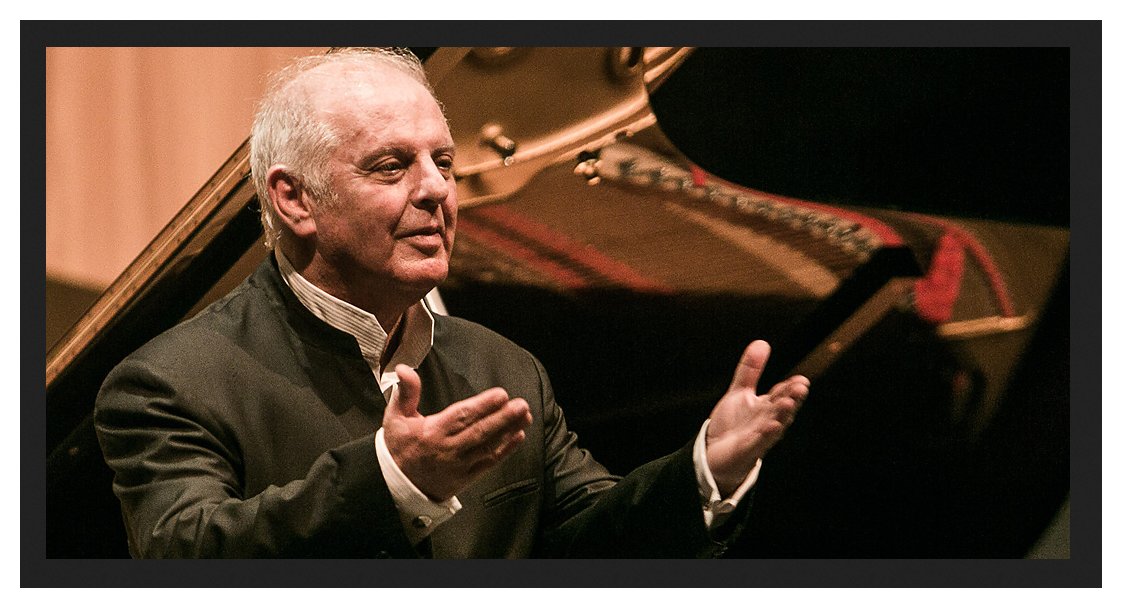Conductor / Pianist Daniel
Barenboim
Two Conversations with Bruce Duffie
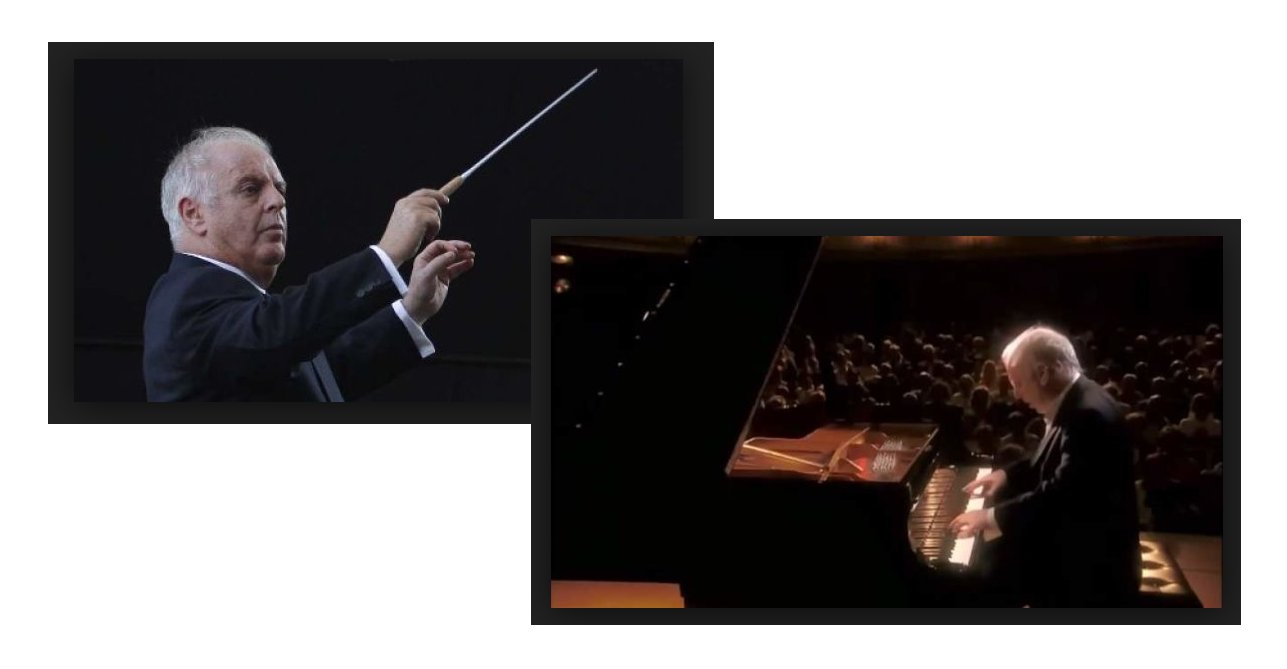
On this webpage are two conversations I had with Daniel
Barenboim. The first was held in November of 1985, when he was
conducting the Chicago Symphony in concerts of Wagner. The second
took place in September of 1993 when he opened the season with the
Verdi Requiem. Material
from each interview was used immediately on WNIB, Classical 97 in
Chicago, to promote the concerts, and again at later times when we
programmed his recordings.
The first interview also appeared in Nit&Wit
Magazine in March of 1986, and heralded the appearance of Barenboim as
pianist for the concerts which included the thirty-two Beethoven
sonatas. That interview is presented here slightly edited from
the published version. Photos have been added for the website
presentation. The second interview appears on this webpage for
the first time as a transcription. Throughout this page, names
which are links refer to my interviews elsewhere on this website.
Daniel Barenboim —
Musician
By Bruce Duffie
Nit&Wit Magazine,
March, 1986
Daniel Barenboim is in demand all over the world for
his musical abilities, and the few places where he performs regularly
are extremely lucky. Chicago must be counted in these lucky few,
for he has appeared here regularly for the last several years with the
Chicago Symphony for concerts and recordings. This season,
Chicago is most fortunate to have Mr. Barenboim at several points in
time, and in several capacities.
The past November, Maestro Barenboim gave concerts
of Wagner. Two performances of the sublime second act of Tristan with cast members from his
Bayreuth production [Johanna
Meier, Rene Kollo, Nadine Denize, and Richard Cohn substituting for
an ailing Hans Tschammer], and two orchestral
concerts containing music of both father Richard and son
Siegfried. It was a weekend not to be forgotten. Now he
returns to Orchestra Hall in the capacity of pianist to give a series
of concerts containing the complete 32 sonatas for piano by Beethoven.
Earlier this year, when was here for the Wagner
concerts, Maestro Barenboim took time from his very busy schedule to
chat with me about many things. Our all-too-brief discussion
focused mainly on the music he was doing then and now. A portion
of this interview was aired on WNIB last November, but here is the
entire conversation.
Bruce Duffie:
First, tell me about the particular problems and
joys of bringing a stage work to the concert hall.
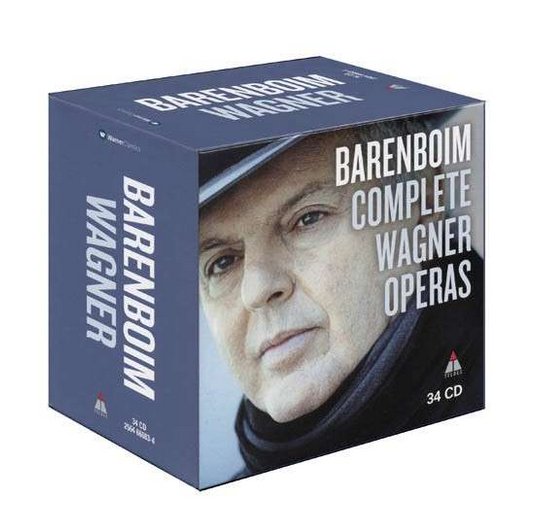 Daniel Barenboim:
Ha! The joy is that one doesn’t have to
argue with stage-directors who go against the music! I mean this
in jest because I’ve had really wonderful experiences with
stage-directors. The Tristan
which I did in for three years
Bayreuth was with Jean-Pierre Ponnelle who is really the most musical
of stage-directors. But some of the Wagnerian opera acts lend
themselves rather well for concert performance. The second act of
Tristan, the third act of Siegfried, the first act of Walküre are
especially well-suited, although it is always incomplete because there
is no stage, and because they do form a very organic part of the whole
opera. But the main advantage of bringing the second act of
Tristan in concert here, of
course, is the Chicago Symphony. I
don’t think you will find an orchestra in the pit of this quality, and
for me this is almost enough reason. And the singers of Tristan
and Isolde are those who have done it with me for three years in
Bayreuth — really four years including the film
we made of it. So
it has really been worked out with a short time of rehearsal with two
people who have not sung it often onstage together, and with the same
conductor. So I hope that these performances will reflect some of
the joys and sweat that we have put into it.
Daniel Barenboim:
Ha! The joy is that one doesn’t have to
argue with stage-directors who go against the music! I mean this
in jest because I’ve had really wonderful experiences with
stage-directors. The Tristan
which I did in for three years
Bayreuth was with Jean-Pierre Ponnelle who is really the most musical
of stage-directors. But some of the Wagnerian opera acts lend
themselves rather well for concert performance. The second act of
Tristan, the third act of Siegfried, the first act of Walküre are
especially well-suited, although it is always incomplete because there
is no stage, and because they do form a very organic part of the whole
opera. But the main advantage of bringing the second act of
Tristan in concert here, of
course, is the Chicago Symphony. I
don’t think you will find an orchestra in the pit of this quality, and
for me this is almost enough reason. And the singers of Tristan
and Isolde are those who have done it with me for three years in
Bayreuth — really four years including the film
we made of it. So
it has really been worked out with a short time of rehearsal with two
people who have not sung it often onstage together, and with the same
conductor. So I hope that these performances will reflect some of
the joys and sweat that we have put into it.
BD: Now
you’ve done it for these several years. Does it get
better and better for all of you and for the public?
DB: In
Bayreuth it is really unique and it works that
way. The productions get better stage-wise and musically year
after year. Everybody comes to Bayreuth in the summer to do these
performances, and then they work somewhere else during the
season. But when you come back the following summer, at the end
of June or the beginning of July for the orchestral rehearsals, it is
as if the eleven months have not existed because you find yourself in
the same place. After doing the performances and then going away
for the year, when they all come back, they automatically bring back
the last performance. So you start rehearsing in the second year
where you left off at the last performance of the first year, and so
forth and so on.
BD: Is that
due to the performers, or to the atmosphere, or
to Wagner, or what?
DB:
Everything. I think a bit of everything, but they are
first-class musicians who work elsewhere during the year.
BD: Do you
find that the covered orchestra in Bayreuth is a
particular help in Wagner, or would that be a good idea in all opera
houses?
DB: I think
it would be a good idea in many operas, but not in
everything. I would hate to play Don Giovanni or Così Fan Tutte with a
covered pit. But I feel that many other
operas which were not thought of like that could only profit.
BD: Even in a
Mozart opera, such as the two you mentioned, where you’re using an
orchestra that
is twice or three-times the size that Mozart had?
DB: Yes. The
thing about the covered pit in
Bayreuth is not just a question of volume. There, the whole sound
— both orchestra and singers — gets
blended before it comes out to the
audience. So anything that requires great transparency and
articulation is not really adaptable for that.
BD: When
you’re conducting an opera, how much do you get involved
with stage-direction, stage-mechanics, etc., or are you just involved
in the music?
DB: Oh no, if you
really want to do an opera well, you can’t be
involved just with the music. The stage problems can only be
solved hand-in-hand with the music. Some of them can be solved
only
through the music, and vice versa. There are a lot of musical
problems with the singers that can be solved stage-wise.
BD: How do you see
Tristan as an opera, as a
piece?
DB: [Laughs]
I don’t think you have enough time on this radio
interview for me to tell you. It’s impossible to tell you.
BD: Is it a
turning-point in music history? Does
everything that comes after it look back to Tristan?
DB: I’ll tell
you something. When I did Tristan
for the
first time in Berlin, before I went to Bayreuth, for a long
time — maybe six, seven, eight months
— I looked at all other music
through the eyes of Tristan,
even music that was written before,
not only after. The piece is so catalytic. It’s not
just that one single chord. That chord, by the way, did not
originate with Wagner. It appears first in a song by Liszt.
But
it is the whole relationship of chromaticism and volume and density of
the orchestral writing which is so different. What Wagner
does for the orchestral musician or a conductor is that it sharpens all
your expressive tools to the maximum. You
need everything in Tristan.
You need the ability to play the most
beautiful, sustained legato,
you need the ability to play extremely
clear and articulated marcato,
you need to be able to play soft
accents, hard accents, to play super pianissimo,
to play super
fortissimo, everything
absolutely to the limit of human
possibility. I also find it extremely useful for every other kind
of playing.
BD: Is Wagner in
and of itself harder or more difficult to play
than any other composer?
DB: No.
Everything is difficult in relation to your real
knowledge of it. Many things seem very hard to people who only
work intuitively. The same difficulties become less so when your
knowledge is in depth and becomes conscious knowledge. In other
words when you know how it is made, not only how it sounds, then the
degree of difficulty changes. Some things remain difficult no
matter how much you know about them.
*
* *
* *
BD: You’ve
made a number of recordings. Do you feel
you’re competing against your own record when you perform?
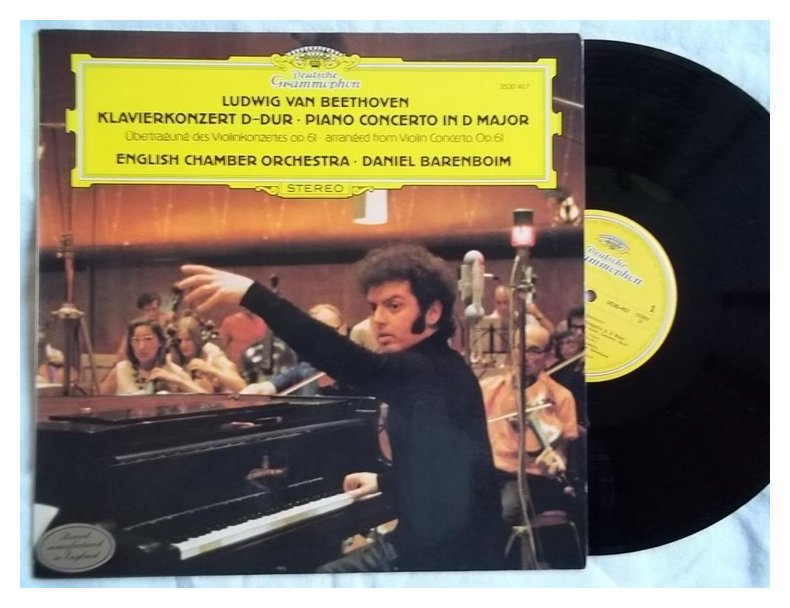 DB: No, I never
hear my own recordings. I have absolutely
no interest in them. Once they are made, for me they are a thing
of the past. The only time that I have sometimes listened to old
recordings is when I have replayed some of the Mozart concertos, and
some of the cadenzas were my own and I didn’t write them down.
But that is for a specific reason. I certainly would never dream
of sitting at home on a free evening and listen to my own recordings.
DB: No, I never
hear my own recordings. I have absolutely
no interest in them. Once they are made, for me they are a thing
of the past. The only time that I have sometimes listened to old
recordings is when I have replayed some of the Mozart concertos, and
some of the cadenzas were my own and I didn’t write them down.
But that is for a specific reason. I certainly would never dream
of sitting at home on a free evening and listen to my own recordings.
BD: Would you
sit at home on a free evening and listen to someone
else’s recordings?
DB:
Hardly. I’m not a great record-listener.
BD: Is it a
mistake for such a large segment of the public to be
great record-listeners?
DB:
[Hesitating] I don’t know. As long as one keeps
in mind that a recording is really second-best, and it will never
replace live music. As much as I admired and respected him, I
can’t agree with Glenn Gould or his philosophy. You can’t say
that it’s an artificial way of making music, but it is an artificial
way of reproducing music. Music is not really reproducible.
It only has a reason for being from this moment to that moment in this
place and not elsewhere. A whole lot of physical considerations
come into being which are not there. When we play the second act
of Tristan in Orchestra Hall,
we automatically but also consciously
play differently than if we were in the pit at Bayreuth or in another
hall. We adjust the acoustics to the sound of Orchestra Hall and
to the degree of reverberation, etc. So when you record in
one studio and then listen to the disc on another machine in another
room, nothing is really as it should be. If I were playing the
same piece in your living room, I would probably play it at a
completely different tempo. Therefore it is a very bastardized
way of doing music, and a bastardized way of listening to music.
BD:
[Mischievously] Then why do you make so many recordings?
DB: Because
I’m probably weak and people ask me to do it and I do
it... certainly not for artistic reasons.
BD: Does it bother
you, then, when someone comes says they enjoyed your recordings of this
or that?
DB: No, I’m very
happy that people enjoy what I have done,
obviously.
BD: Is there the
same artificiality in film — your Tristan film,
for example?
DB: The Tristan film was made during
performance. The
performance was filmed, so it is not like the Don Giovanni of
Joseph Losey, or a regular cinematic film. Being a film of a
performance, I suppose it has a degree of faithfulness that it wouldn’t
otherwise. I’m not so keen to see filmed opera, even though
they’re very impressive in many ways. I simply cannot get used to
things like the reverberation of a studio while they are singing in the
open air, or when the person gets further and further away in the
perspective, but the voice gets louder and louder and louder. I
can’t, frankly, come to terms with this artificiality. But, if
this really gets more people in the opera house and gets them
interested in music, fine.
*
* *
* *
BD: Tell me the
secret of performing
Mozart... or is this another six-hour question?
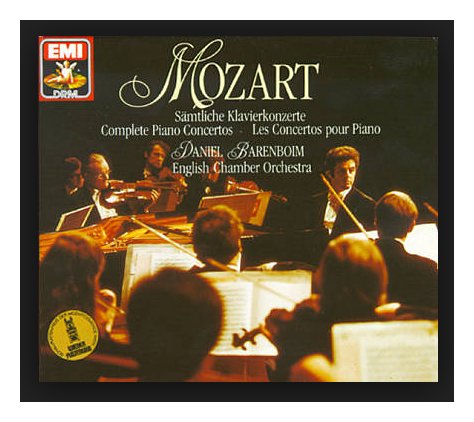 DB: [Laughs] No,
this is not a six-hour question, it is an
impossible question. I don’t think there is a secret about
it. It is stylistically very difficult. It is so complete
that it doesn’t allow any underlining. This is what is so
difficult. In other words, when you play a phrase of Tchaikovsky
or Wagner or Brahms, or even of Beethoven, you can
underline certain elements or certain notes in the expression. In
Mozart there are always ten or fifteen or twenty different expressions
going on at the same time, and each one must have its own purity and
its
own independence. Mozart does not tolerate this kind of
underlining. The minute you start to make a point, you are
through with it.
DB: [Laughs] No,
this is not a six-hour question, it is an
impossible question. I don’t think there is a secret about
it. It is stylistically very difficult. It is so complete
that it doesn’t allow any underlining. This is what is so
difficult. In other words, when you play a phrase of Tchaikovsky
or Wagner or Brahms, or even of Beethoven, you can
underline certain elements or certain notes in the expression. In
Mozart there are always ten or fifteen or twenty different expressions
going on at the same time, and each one must have its own purity and
its
own independence. Mozart does not tolerate this kind of
underlining. The minute you start to make a point, you are
through with it.
BD: Is all this
complexity what makes it such that it will never
die?
DB: Probably.
BD: Are there
other composers who are like that?
DB: Like
Mozart? No. For me, it is a unique
phenomenon.
BD: You’ve done
the symphonies, the piano concertos, and the
operas. How are they different or similar?
DB: Many of the
great piano concertos are very operatic in
nature. The finale of the E-Flat
Concerto, #22, could be out of Figaro.
Some of the Da Ponte operas are
as intimate as chamber music, and they are very much
connected. Therefore I think that the best performances of the
operas are the ones which have the chamber music like quality about
them, and the best performances of the piano concertos are the ones
that have an operatic taste about them.
BD: So they all
relate together out of the mind of Mozart?
DB: That’s right.
BD: Are the best
performances of Wagner like
chamber music, or are they like symphonic works?
DB:
Everything. The most terrible thing is this accepted
pre-conceived idea of the fat, loud, Wagner sound. This is only
one side of Wagner. So much of it is extremely delicate and
extremely transparent, and, if you want, extremely
chamber-music-like. One of the most important things in a Wagner
performance
is really balance. The minute you start balancing so
that one can hear more of what is important, then suddenly everything
becomes more transparent and at the same time richer.
*
* *
* *
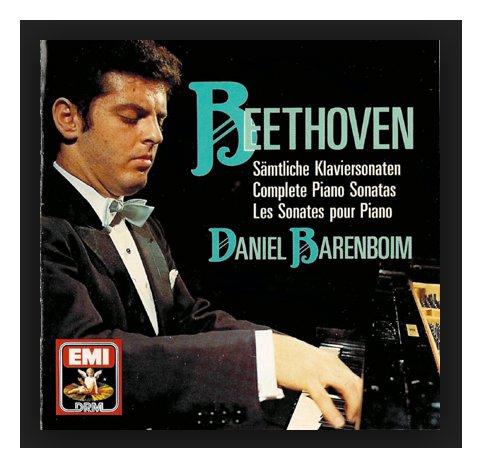 BD: Let me ask about
Beethoven. You’re going to be
presenting all thirty-two sonatas. Do they belong together as
a unit?
BD: Let me ask about
Beethoven. You’re going to be
presenting all thirty-two sonatas. Do they belong together as
a unit?
DB: Well, they
were not conceived as a unit, obviously, but they
give the most complete picture of Beethoven, more than the nine
symphonies. The most complete picture of Beethoven that you get
is in the piano sonatas and the string quartets. It is not the
same
in the Mozart piano sonatas. They don’t really give you a
complete
picture of Mozart. You have to go to the piano concertos or the
operas for that. But every aspect of Beethoven is
there. Again, as with Wagner, there are always pre-conceived
ideas. When you say “Beethoven,” people immediately think of the
Eroica or the Fifth Symphony, all the obviously
more dramatic
pieces. But the less dramatic pieces are just as much part of his
nature.
BD: Composers go
in and out of fashion. Is the public right
in its taste dictating that they’ll have more Mozart or less Mozart,
more Wagner or less Wagner, more Beethoven or less Beethoven?
DB: I don’t know
that the public really dictates that.
There are some composers that have always been in fashion. At
least
from the moment that they became in fashion they have never left that
place. In the case of Mozart, in many countries he was accepted
very late. But in that respect, Mozart and Beethoven are
absolutely above all possibility of fashion.
BD: Is there any
kind of musical line that goes from one composer
to another over the centuries?
DB: Wagner would
have been impossible without Beethoven,
and Beethoven would have been impossible without Mozart. But if
you think of a line, then you must go Mozart, Beethoven, Schubert,
Weber, Wagner... Schumann, also, even
Liszt. It is all very connected. The only composer
historically speaking who is unnecessary is Brahms. I’m not in
any way meaning that the music is any less beautiful or less important,
but historically speaking, if Brahms had not existed, music today would
be exactly the same. Maybe Schoenberg was the only one who was
influenced in any way by Brahms, but otherwise absolutely not at
all historically speaking. Mendelssohn is the same
thing. If Mendelssohn had not existed, the history of music would
be exactly the same. We would be a lot poorer. Don’t
misunderstand me. I’m not saying that they didn’t write beautiful
music. In the same way, historically speaking, Debussy is one of
the most necessary composers. In fact, after Wagner, probably the
most
necessary composer is Debussy. The whole of the twentieth century
could not
exist without him. Stravinsky could not exist without Debussy;
Bartók, also,
and Webern.
BD: Is there any
composer who is living now who is absolutely
necessary?
DB: The more of
his works I do, the more I am taken by a lot of
music by Pierre Boulez.
Whether it is of that historical
importance I don’t know. I think we need more distance in time,
probably, but he certainly writes very impressive and touching music.
*
* *
* *
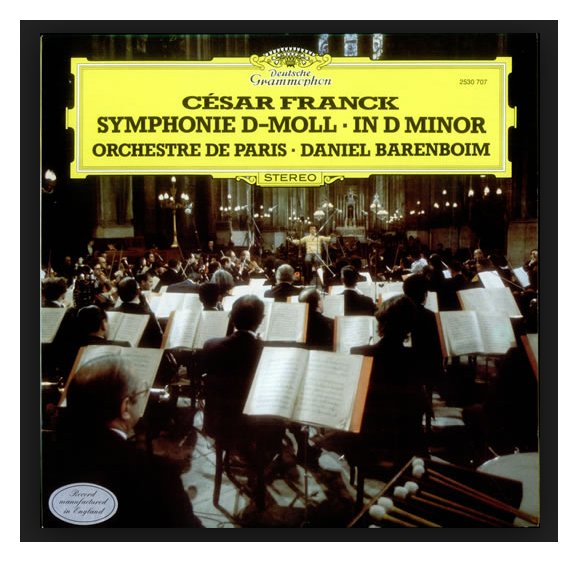 BD: You’ve made a
recording of Il Martrimonio Segreto
by
Cimarosa. Why is that work not more well-known?
BD: You’ve made a
recording of Il Martrimonio Segreto
by
Cimarosa. Why is that work not more well-known?
DB: I don’t
know. I think it’s a lovely opera and I really
enjoyed doing it.
BD: Whenever we
play it on WNIB we get calls asking if it’s
Mozart. Is that a mistake to think it’s by Mozart?
DB: No. It’s
so Mozartian in character.
BD: Are there any
composers in the “standard repertoire” who
really shouldn’t be there?
DB: I think that’s
what very much a matter of taste.
BD: How do you
balance your career — opera/concert/solo
recital/chamber music?
DB: Basically, I
don’t guest-conduct. I come to Chicago,
certainly not as much as I would like to. I would be much happier
coming more, but I simply can’t. I can’t multiply myself by
four. I don’t want to give up playing the piano, and I enjoy very
much my work with the orchestra in Paris. I’ve been there ten
years and I find it extremely satisfying. And I like to do
more opera. Those are my three priorities. Other than that
I
come here a little, and I go to the Berlin Philharmonic a little.
Those two orchestras are very close to me musically and humanly.
And that’s all.
BD: You say you’d
like to do more opera. How do you decide which
operas you will conduct?
DB: I was asked to
do the new Ring in Bayreuth
and this is
something that I am greatly looking forward to.
BD: How does that
present more problems than Tristan?
DB: [Laughs]
I will tell you after I’ve done it!
BD: Does opera
work in translation?
DB: Some operas
do, others don’t. I must say that I
worked last year for the first time with the “surtitles” which are so
popular here in America. We brought the Paris production of
Figaro to Washington D.C., and
it was extremely well done and an
extremely positive solution to the problem. I thought that the
audience really enjoyed the text much more so than normal.
BD: Thank you for
coming to Chicago, and for spending so much
time this season.
DB: Thank you.
Almost
eight years later we met again and had another conversation . . . . . .
. . .
BD: Let
is talk a little bit specifically about the Verdi Requiem to use on the air
tomorrow. Then I hope we can speak a bit about music in general?
DB: Whatever
you want!
BD: Very
good. [Starting the segment for immediate on-air use] I’m
speaking today with Daniel Barenboim, the Music Director
of the Chicago Symphony Orchestra, who is about to begin the brand new
season with the Verdi Requiem.
First, tell me the joys and
sorrows of combining the orchestra with the human voice.
DB: The basis
of all music is, really, the
human voice, because it obviously comes from the actual body, and not
from an outside instrument. This is why many things are more
difficult for singers. If
a pianist is nervous, upset, or tired, the piano is the instrument and
still stays in spite of that, whereas the slightest difficulty or
discomfort shows itself in the human voice. But real
expression, where music really comes from, is the human voice, and
everything else is... I wouldn’t say an imitation, but it’s a further
development of what the human voice can produce.
BD: Is this
why in rehearsals you would
say, “Use a singing line?”
DB: Probably,
yes.
BD: If there
is a bit of tightness or nervousness in the
throat, is that in any way the conductor’s responsibility, or is it
merely the singer’s responsibility to overcome as a professional?
DB: A
conductor can be of great help to
a singer in a situation like this. You can’t completely cure
certain things, but a conductor can be of great use, in both musical
and psychological or human help to a singer.
BD: You’re
doing the Verdi Requiem
to open this season. It’s sometimes been called Verdi’s greatest
opera. Do you agree with that?
DB: Yes and
no. It is a very theatrical
piece, but it is not really an opera. There is a difference from
a piece being theatrical. Actually, the Mozart Requiem,
for instance, is also theatrical in its own way, in its own style,
whereas the Brahms isn’t, or the Fauré isn’t. In
that respect, Verdi is, but it is the combination of
the theatricality with the religious content that make the Verdi
Requiem such a special piece.
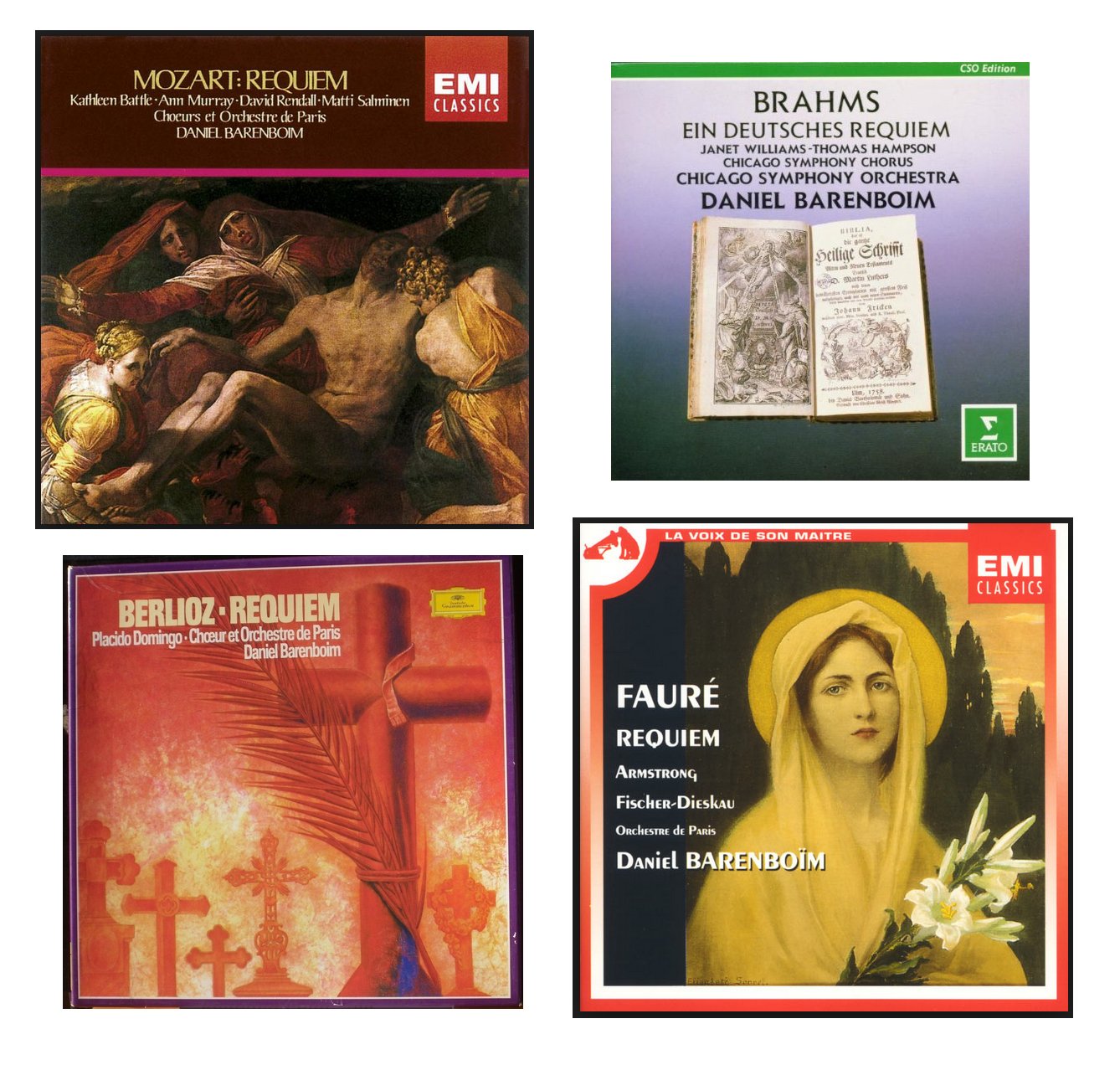
BD: Is that
at all because Verdi and Mozart were men
of the theater, whereas Brahms, and to a lesser extent,
Fauré were not?
DB:
Probably. With Brahms it’s
also the fact that it is a different text. Although
it’s called a Requiem, as you know, it’s not the Catholic Mass.
It is the
protestant music, and takes a lot of the text from the Old
Testament. But it’s very interesting to compare the
real Catholic requiems of Mozart, Verdi, and
Fauré, and how they dealt with the different concepts
— what the fear
of God meant for one, and for the other was almost a relief, and the
feeling of good, etc.
BD: Yet
there’s really not a religious quality
to it because members of all religious denominations and sects can
enjoy it.
DB: Oh, of
course. The Verdi Requiem
is probably one of the most universally
accepted works of music imaginable, and fits almost any special
occasion. It doesn’t have to be only an occasion of sadness or
of tragic circumstances. It is an expression of man’s position in
this world in relation to his or her creator, whoever that may be, and
as such it is a piece that
speaks to everybody.
BD: We’re
talking a bit about the text. In
an operatic piece, we talk about the balance between the music and the
drama. Does that shift at all for the Verdi Requiem, being a
sacred text?
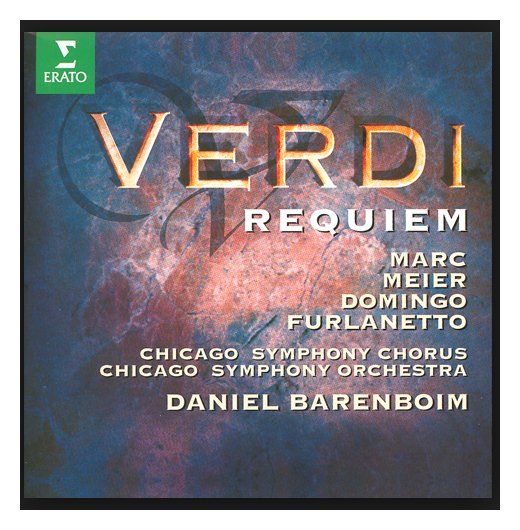 DB: I don’t think
so. The main principles of putting together text and sound are
just as evident in the Verdi Requiem
as they are in opera.
DB: I don’t think
so. The main principles of putting together text and sound are
just as evident in the Verdi Requiem
as they are in opera.
BD: You do
this in one piece, just as a complete
work without any intermission?
DB:
Yes. Apparently, when Verdi conducted it, I
think it was in Paris, they did an intermission after the “Dies Irae,”
but I think it really loses the tension that can be, and should be
accumulated by performing it without an intermission,
without a break. If I’m not mistaken, this was the
only occasion when Verdi conducted with a break. Any other
times it was done was without stopping.
BD: Is there
anything at all that should
go with this work, or should it stand completely alone on a concert?
DB: Oh, it
must stand alone. From
beginning to end it should really fill the evening, the day, for the
performer and for the listener.
BD: As Music
Director of the
Chicago Symphony, do you make sure that there are several great big
choral works of this stature in every season?
DB:
Yes. We are very fortunate that we
have such a wonderful chorus in Chicago, and we have to take advantage
of that. The most wonderful thing about it is that a
chorus has been attached to the orchestra for so many years, and
therefore there is a unanimity of style, a homogeneity of style that
you cannot get with other choruses. You can find
wonderful choruses, but when they work regularly with the same
orchestra they get used to the same sound and the same kind of
articulation and color in the music. This chorus and this
orchestra’s had the good fortune to work together with the same chorus
and with Margaret
Hillis for so many years. It
is a very unusual situation for a great orchestra to do that. I
know that we are also, from this point of view, the envy of
many great orchestras who do not have a chorus attached to them, and
have to always import one, including the Berlin Philharmonic.
BD: You rely
on Margaret
Hillis to train the chorus, and she is about to retire. Are you
looking for someone who will carry on her
tradition, or are you looking for someone who brings something new?
DB: Those two
things are not incompatible. It has to be somebody who
understands what Margaret Hillis
has been able to create here and develop and therefore continue in
this line, and also have something of his own to say, not just an
imitator.
BD: When
you’re working on the big choral works,
do you collaborate with the choral director, or do you expect him or
her to prepare the chorus and then let you finish shaping
the sound and the idea?
DB: It
depends on the piece. I’ve
worked for so many years now with Margaret that there’s almost no need
for me to even meet with her before and discuss. If
there is something special, then obviously we do, but it is
very much a real collaboration. It can only be that way.
The
idea that the chorus director can prepare the piece so that any
conductor could deal with it — in other words,
so that the notes are
there and the dynamic is there and the pitch is there — doesn’t
really
work. Musicianship and phrasing is not like the cream that you
put on top of the cake. You don’t add it. If you prepare a
work in a purely mechanical way,
it’s impossible to then do it musically. It can only
work if the choral director is in sympathy with the conductor of the
evening, and vice versa.
BD: So you
want the choral director to have a bit of input in terms of
interpretation and feeling?
DB: Of
course, yes.
BD: Is it a
little bit easier because
the Verdi Requiem has been
sung here a number of times, or would it be
easier if this were a brand new work that you were shaping from the
beginning?
DB: I don’t
know. Some works that have been
done have been easier because they have been performed,
and others because they haven’t. It depends very much on the
piece.
BD: Is there
any ambiguity at all in
opening the orchestra season with a big choral work rather than a big
orchestral work?
DB: I don’t
think so. The
great choral works, like the Verdi Requiem,
are very festive pieces,
and they fit a very festive occasion, which is the
opening of the season. Therefore, it is absolutely
right to do it with the Verdi Requiem,
as we are this year.
*
* *
* *
BD: You have
a number of rehearsals
before the concert. Is all your work done in rehearsal, or do you
leave something for that spark of the evening?
DB: Oh, you
have to leave a lot for the evening, but
what you leave for the evening doesn’t work unless the actual
preparation has been done. You can’t just play it through and
then really make
the performance in the evening. The more you rehearse and prepare
in detail, the more freedom you will have in the evening. If you
don’t prepare, then it is very much a
question of pure luck, and that it shouldn’t be.
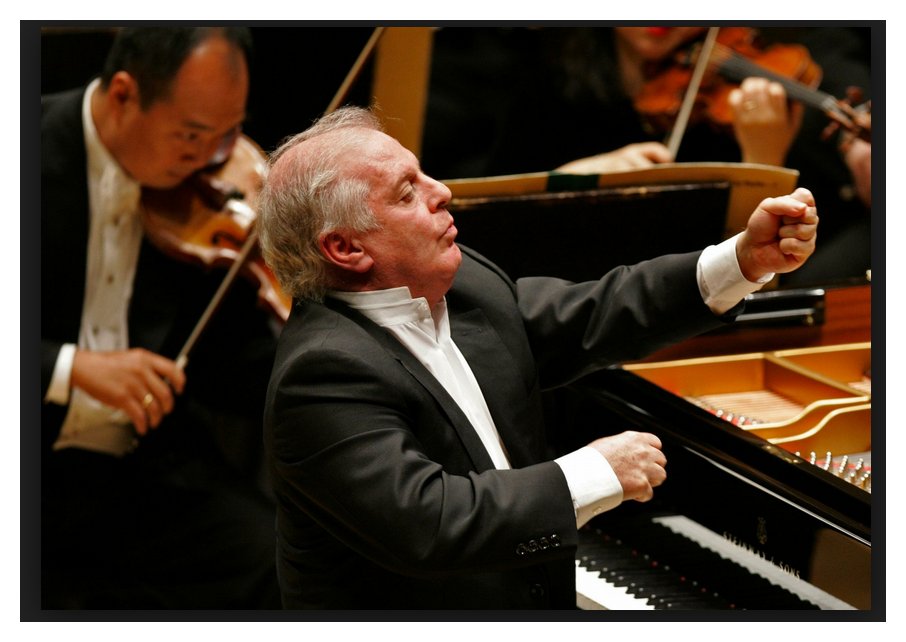
BD: Even with
an orchestra such as this, that is
supposed to be so very fast?
DB: That has
nothing to do with the quality of the
playing. That has to do with the quality of the music-making and
what you do with it.
BD: You don’t
need to mention specific times, but have there been any performances
which you felt were perfect?
DB: No.
No, I don’t think this
perfection exists. We have such a strong feeling that we have to
conserve everything. We are very much
a sort of a society that keeps records, and are very much interested in
the past and what has become, and music is not like that. Music
is not to be conserved, and not to be preserved. I don’t think
that it can be. What is so special about a special work on a
special evening is not something that can be preserved, and is not
something that one should attempt to do. Therefore, the
word “perfect” doesn’t exist. It was right for that particular
evening, in that particular acoustic, in those particular circumstances.
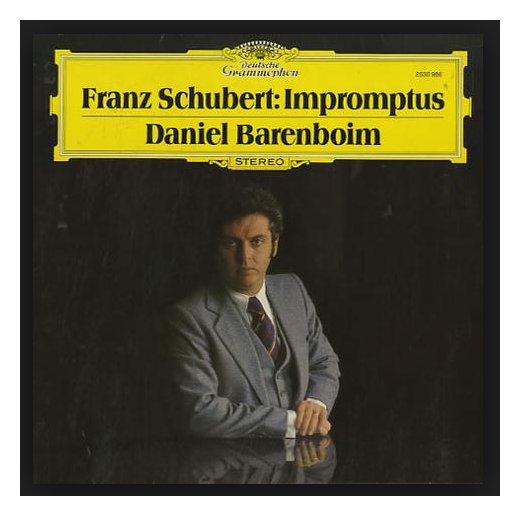 BD: So it’s just the
performances that
should not be preserved but the music and the inspiration
should be?
BD: So it’s just the
performances that
should not be preserved but the music and the inspiration
should be?
DB: Of
course, of course.
BD: Then each
time
you’re really starting from nothing, without any kind of background at
all?
DB: No, not
from nothing because there has
been a lot of work of preparation being done. But in the actual
act of
creation, of course you start from nothing. The Beethoven Fifth
Symphony doesn’t exist now as you and I are talking. It
doesn’t
really exist, and all these records that exist in the shop are not
it. Beethoven’s Fifth
will begin to exist again the moment an
orchestra somewhere plays the first note of it and goes on
playing. Then it comes to life.
BD: Does it
begin to exist the moment the record
begins to play?
DB: I don’t
think so. I don’t
think the record can capture the very essence of the music. It’s
a document of a certain
performance, but no more than that. There cannot be what the
public and critics sometimes want to hear, which is a definitive
performance. It doesn’t exist.
BD: But it
could be definitive for an evening?
DB: Yes.
BD: Do you
want every evening to be
definitive for that evening?
DB: That is
an impossible situation.
BD: Well,
we’ve been dancing around it, so let me hit you with a great big
question. What is the purpose of
music?
DB: Why does
music have to have a purpose? What is the purpose of having a
symphony orchestra?
What is the purpose of having a concert? That question I can
answer relatively easily. The music is there to provide happiness
or solace to people who are in difficulty, but that is not really what
music is about. Music is neither
descriptive, nor does it have a purpose. Music doesn’t become
something. Something can become music, which is a very different
thing. Sound can become music, provided they are put together in
such a way that they relate permanently to each other, and influence
each other permanently. Then it becomes something, but it
doesn’t have a purpose as such. It can be used for many things by
people. It can be used for all sorts of
motivations, but that is not the nature of music itself.
BD: So sound
is not music until it is put together?
DB: Sound is
only the language, the means by which
music can express itself.
BD: John Cage was saying
that all sounds are music, even if they are random.
DB: I don’t
believe in that. I believe that the
organic element, the feeling of organic belonging to each other, of
unity of the sounds is what makes music.
BD: So
where’s music going today?
DB: If only I
knew! We are in a difficult
period about development of music, and have been for a long time
now. So many
people who go to concerts regularly and who have a certain
closeness to music still think of music written in the beginning of
this century as modern music. They think of Schoenberg. A
lot of people will tell you the Schoenberg Gurre-Lieder — maybe not that
piece, but some of the Webern pieces — all this
is
modern music. We are now at the tail end of this century, and
these were written between 1910 and 1920. If you transport this
century back, I don’t think for
one moment that people in 1893 thought of late Haydn symphonies or
middle Beethoven
symphonies as modern music, which is the equivalent in the number of
years.
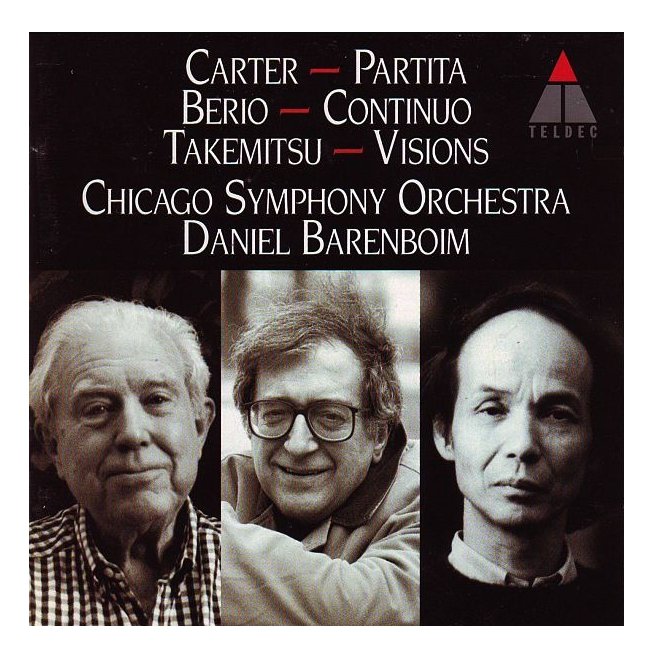 BD: Were they
thinking of late Tchaikovsky and
Dvořák and even Puccini as their moderns?
BD: Were they
thinking of late Tchaikovsky and
Dvořák and even Puccini as their moderns?
DB:
That was their modern music. I don’t know whether it has to do
with the
break in tonality and that so much music after Wagner and
Mahler went into the atonal system, or whether it has to do with other
phenomena, the fact remains that there is a
very unhealthy state of affairs. Not only the
public, but so many musicians exist
today who spend their whole life with a great amount of dedication and
enthusiasm to music, and have no contact whatsoever with music that has
been written in the last hundred years. I feel this is a very
unhealthy situation.
BD: How can
we cure this?
DB: I don’t
know. I try in my own small way to keep
absolutely in touch with the music of today, and to perform it with a
certain regularity. Part of the problem is
that the new pieces are not played over and over again. How do
you expect somebody to go to a new work of Boulez or of Lutosławski or
whoever it may be, and hear it once and never hear it again
and like it. There’s the question of habit, of hearing this
music with a certain amount of regularity, which is very important.
BD: Will that
help to create a clamor for the
new works?
DB: I hope
so. That’s one of the
ways.
BD: In the
last few years, it seems that in some circles we’ve been coming back to
either tonality or a kind of tonality. Is this a good thing, or
just a thing?
DB: I’m not a
believer in neo. I don’t believe
in Neo-classicism and I don’t believe in Neo-romanticism. If it
is worth experimenting in order to find new
language, then it is positive and it’ll probably work. If it’s
just going back because we can’t find something else, then I don’t
think it will be substantial.
BD:
Specifically about new pieces, you
have a whole raft of them in your office that you’ve been asked to
play. How do you decide which
ones you will do?
DB:
[Matter-of-factly] I read them.
BD: Then what
is it you look for? What is it
that you want to find that will make you want to do this one or not do
that one?
DB: It
depends on the nature of the
piece. It is exactly like in the music of the past. There
are some works of the past that appeal to me because of the structure
or
because of the harmonic language, and others because of the color or
many other reasons. I don’t look for something specific, and if I
find it, that’s what I’ll do. The only thing that I look for is
something that is expressive and that is of interest.
BD: Do you
have any advice for someone who wants to
write a piece for the Chicago Symphony Orchestra, or indeed, any
orchestra these days?
DB: I cannot
give you a concrete piece of advice, no.
BD: Okay, but
you do encourage them to continue
writing?
DB:
Absolutely. Absolutely.
*
* *
* *
BD: What
advice do you have for
conductors coming along?
DB: To forget
recordings!
BD: Forget
them completely???
DB:
Recordings, yes. A young conductor came to
see me when I was still conductor-director of the Paris Orchestra, and
thought he should be engaged to conduct the orchestra. He
explained to
me why he thought he should do that. He was so good and he was
so talented, and he had a lot of enthusiasm, and he felt he could
really do wonderful things. So I said to him, “Suppose you were
given a concert. What kind of program
would you like to do? What kind of music appeals to you?” I
thought this way I would hear what really interested him, and he
said, “Anything that is in the Schwann
Catalog.” [Both laugh] That is a very sad state of
affairs. It’s a funny story, but it’s a very sad state of affairs.
The Schwann Catalog (previously Schwann Long Playing Record Catalog
or later Schwann Record And Tape
Guide) was a catalog of recordings started by William Schwann in
1949. The first edition was hand-typed, 26 pages long, and it listed
674 long-playing records. By the late 1970s, over 150,000 record albums
had been listed in Schwann.
The catalog initially focused on classical LPs, but also included
sections on popular music, jazz, musical shows, "Spoken and Misc.", and
so on. By the 1970s the catalog was split into two volumes: the monthly
Schwann-1 included all stereo classical and jazz recordings and stereo
popular albums less than two years old, while the semi-annual Schwann-2
included all monaural albums, older pop recordings, and spoken word and
miscellaneous albums. In May 1986, the publication became known as the Schwann Compact Disc Catalog.
Later, the catalog split into Schwann
Opus for classical music and Schwann
Spectrum for categories such as jazz, religious, spoken word and
international music.
The early editions indexed and reviewed LPs that contained the same
classical works. As the volume of music it catalogued grew, the amount
of information for each entry was reduced to a single line.
|
BD: You
should have challenged him to play Machaut, or something equally
incredulous!
DB:
Yes! When we recorded the Emperor
Waltz of Johann Strauss with the Chicago Symphony, I’d forgotten
my
score at home, and I took the score that was in the orchestra
library. There was a Forward
in the score that told a little
about Johann Strauss and about the waltz, etcetera, etcetera,
etcetera. It was a conductor’s score, and yet it told a little
about the composer and about the piece, and about Vienna in that
time. Then it said, “There is a very good recording of this piece
on
Such-and-such a label, conducted by so-and-so, for study
purposes.” [Both have a huge laugh] For study
purposes! If in a score you
are recommended to seek recordings for study purposes, then I think we
are not really
going to get very far!
BD: [Trying to
make sense of this] Are the musicians short-changing
themselves by not going to the score but rather going to the records?
DB: Well, the
recording cannot be a substitute for
studying.
BD: Should
the young conductors, perhaps, go to study
performances?
DB: Of course
they should study performances. They should have great curiosity
to see also
how things are achieved, to find out about the instruments, to find out
about the
orchestra, to find out about the structure of the music, and find out
about performances of other conductors.
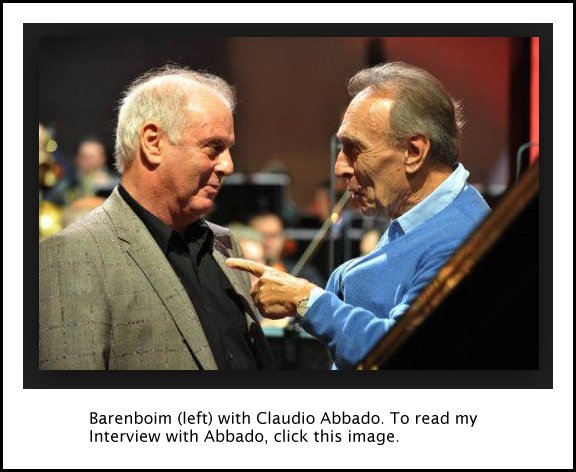 BD: By
attending performances of other conductors?
BD: By
attending performances of other conductors?
DB: Yes, and
rehearsals, especially. It’s in rehearsals that you
can really learn much more.
BD: Despite
all this, you’ve made an immense number of recordings. Do
you conduct differently in the recording studio than you do when you’re
in concert hall or the opera house?
DB: No.
I conduct differently in different
acoustics. If I’m conducting in Orchestra Hall, then I
conduct differently than if I conduct in a very resonant church
because the sounds really only exist at that particular moment and in
that particular space. We are so used to living with the noise of
sound around us — noise of cars and of
elevators, and of hundreds of things that surround us — that
we have
sometimes difficulty remembering that sound in music really
exists only at that particular time and in a particular space.
It’s not just something that can be amplified. Those are
things that you can do for certain purposes which have nothing to do
with the music. It can be very laudable purposes, like education,
but it has nothing to do with the nature of the
music.
BD: So
there’s an artificiality to it?
DB: Yes, of
course.
BD: Perhaps
you should start each
Chicago Symphony concert with a minute or two of silence, to allow us
to listen to the hall before the sound comes in.
DB: The first
note that the orchestra plays, or
that any instrument plays, doesn’t exist on its own. It is
already in relation to the silence that precedes it. If the flute
would start the Prelude to
the Afternoon of a Faun, out of a lot of noise, or crackling
papers, or
whatever it may be, it’s a very different thing. The very first
note, the famous C-sharp, or the flute itself, is expressive in
relation to the silence that
precedes it. Therefore, silence is absolutely essential.
BD: Do you,
as the conductor, have any control over
that preceding silence?
DB: I don’t
have control over it. I wait in the
hope that it comes. I wait until it is really absolutely quiet,
and then I can
establish and feel that silence onto which will come the first note.
BD: So you
wait for your silence to come along?
DB: That’s
right.
BD: Do you
usually get it?
DB: Yes.
BD: Has your
relationship with the Chicago Symphony
changed at all now that you’re Music Director? You’ve been
conducting here for something like twenty years. These last
couple of years now, you’ve been Music Director. Is it different
at all?
DB: Not in
essence, no. The main difference is that as the Music Director
you don’t only
rehearse the works for a given concert, but you rehearse in such a way
that you build a common style to the orchestra and to you. In
other words, when you rehearse one Beethoven symphony, in a way you are
rehearsing also for the other symphonies, for the development of a
style of articulation, of balance, of color.
BD: Are you
rehearsing Beethoven, or are
you rehearsing Romantic Style?
DB: What is
Romantic Style? You rehearse everything that has to do with the
realization of music, articulation, and balance, every means of
expression that is expressed through sound. The work in question
gets brought to performance level as a
result of that work. But if you come as a guest conductor, then
you have three or four rehearsals, whatever the case may be. You
prepare the program and you give the best of yourself.
The orchestra gives the best of itself, and it’s finished.
BD: If you
are appearing as
a guest where you may or may not have conducted before, how
long does it take before the orchestra is yours?
DB: It would
be very difficult for me to answer this
question, because it’s so many years that I have not conducted in a new
situation. I don’t conduct out
of Chicago and Berlin, and once in a while
the Vienna Philharmonic. I conduct really only orchestras
with which I feel a great affinity.
*
* *
* *
BD: Is there
a secret to playing Mozart?
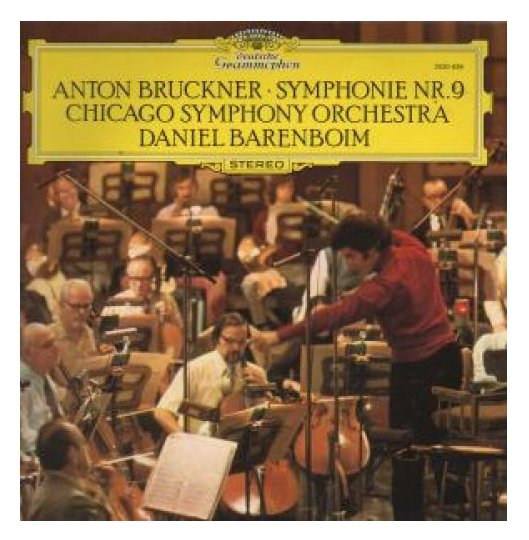 DB: Not more and
not less than to play something
else, except that it is more transparent, and therefore more
dangerous. You hear everything. Everything! The
slightest sin in phrasing or articulation, which can pass unnoticed, or
relatively noticed in other music, really strikes the eye
immediately. If the accent is too sharp or too soft, or the
balance is not right, or
the articulation is not exactly perfect, those things really jump
to the eye with Mozart.
DB: Not more and
not less than to play something
else, except that it is more transparent, and therefore more
dangerous. You hear everything. Everything! The
slightest sin in phrasing or articulation, which can pass unnoticed, or
relatively noticed in other music, really strikes the eye
immediately. If the accent is too sharp or too soft, or the
balance is not right, or
the articulation is not exactly perfect, those things really jump
to the eye with Mozart.
BD: [With a
gentle nudge] Is this to say you can get away with more in
Bruckner?
DB: In a
certain way, yes. In others, of course
not, but in a certain way, yes. It’s not as transparent.
BD:
Is there something special in the Mozart concerti when you are playing
and conducting? Is there a special affinity, or a deeper affinity
that you have
because you are both soloist and conductor?
DB: It’s not
a question of deeper affinity. It’s more a question of a greater
homogeneity, because if you
have a separate conductor, still you have to relate to him.
He is understanding what you are doing and then he transmits it to the
orchestra. Whereas this way, the channel is
directly from the soloist to the orchestra, and when the
orchestra does not have somebody in front of them beating every
quarter note, they listen also in a more sensitive way. So, it
brings out the best in everybody.
BD: When you
are conducting a guest soloist, are you, perhaps, a little more
sensitive to a
pianist than, say, a violinist or a bassoon player?
DB: I don’t
think so.
BD: You make
a conscious effort not to be?
DB: No.
I don’t even have to make a conscious effort because when I conduct
with a
piano soloist, I don’t think how I would play this piece. If he
is a convincing musician, then it is the same for me whether he
plays piano or violin.
BD: So you
wait to be convinced?
DB: Yes.
BD: Should
the audience wait to be convinced by you?
DB: I don’t
know.
BD: If money
were not a consideration, would you
bring more operas like the three by Mozart you did a couple of years
ago?
DB: I thought
the experiment of the Mozart
operas was very, very positive, and I would like to do some more,
yes. To have an orchestra of the quality of the Chicago
Symphony playing operas puts them really on a new level.
BD: Should
money, the expense, be a
consideration when you’re dealing with purely musical ideas of setting
up a season?
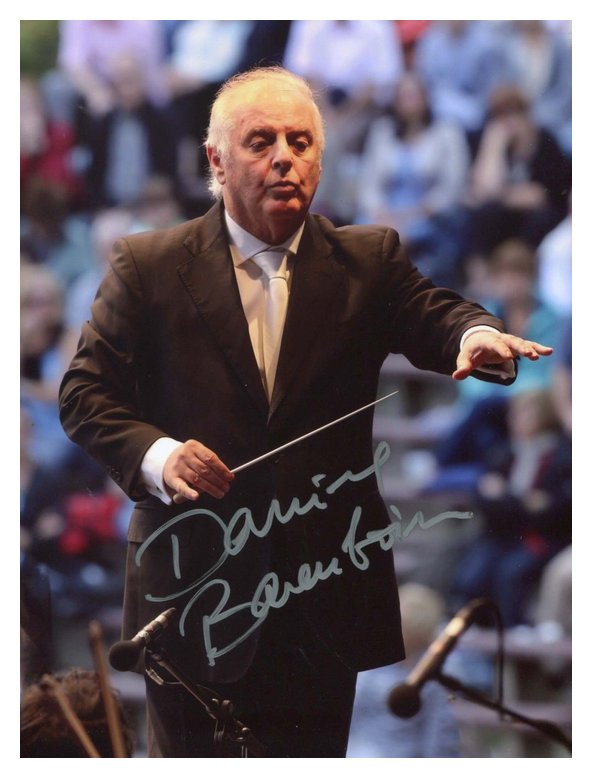 DB: Of course it
shouldn’t, but it is.
DB: Of course it
shouldn’t, but it is.
BD: How much
of a
burden is it for you to have these financial considerations?
DB: Difficult
question to answer. Some.
Of course it would be nice sometimes just to not think about financial
considerations and just do
this, that, and the other. But sometimes out of difficult
material situations there is even more spiritual
energy. Or sometimes out of difficult situations, one finds
solutions
that one wouldn’t find in a climate of total freedom from material
difficulties. For some time now, all
over the world we are fighting with the difficult economic situation,
and my hope is — as I’m sure everybody else’s is
— that it won’t last very
much longer. It would be very wonderful to be able to do the
Mozart
operas again, or to do another opera with the same setup.
BD: How much
should
you play the same works over again, and how much should you bring new
works and unknown old works to the audience?
DB: I think
you need a bit of both. You need to
be able to bring the works the audience knows and
loves, and bring them on as high a level as possible for the audience,
and also bring some new works in the hope that they will also become
known and loved.
BD: Is
conducting fun?
DB: Oh,
yes. Very much so.
BD: As Music
Director you have to plan at least
the season or two, or maybe even three or four in advance, at least
with some of your ideas. Do you like having these ideas so far
out in the future?
DB: Sometimes
yes, because it allows you to prepare
for special events or special series or a special idea, with
enough time to do it. Other times, of course, it is difficult,
because you don’t really know exactly what you will want to do two and
a half years from now on a Friday afternoon. It’s very difficult
sometimes, but altogether,
one gets used to that.
BD: You’re
never disappointed when you get to that
Friday afternoon two and a half years down the line?
DB: No.
BD: With all
of the various things you do — conducting, playing piano
solo and in chamber groups — how
do you divide your career among all of those things?
DB: I do four
months with the Chicago Symphony, I
do four or five months at the opera in Berlin, and I go to Bayreuth in
the summer. In between, whenever I can, I play the piano.
That’s all.
BD: Is there
something that you wish you
could give more time to, or do you just let it happen?
DB: Sometimes
there are periods when I
wish I could play a little more the piano than I do at the moment, but
in the situation that I am, trying to build the opera house in Berlin
again after so many years of difficult situation there, I can’t do
it. But with time, I hope I will be able to dedicate more time to
piano playing again.
BD: Is it
safe to assume that if you could, you’d
have 48 hours in every day rather than 24?
DB:
Absolutely. Wouldn’t you?
BD: Of
course! Thank you so much for chatting with me. I
look forward to the season.
DB: Thank you
very much.
© 1985 & 1993 Bruce
Duffie
These conversations were recorded at Orchestra Hall in Chicago
on November 2, 1985 and September 11, 1993. Portions were
broadcast on WNIB the following days,
and again in 1997. The first interview was published in Nit&Wit Magazine in March,
1986. This transcription of the second interview was made in
2015, and both were posted on this
website
at that time. My thanks to British soprano Una
Barry for her help in preparing this website
presentation.
To see a full list (with links) of interviews which have been
transcribed and posted on this website, click here.
Award
- winning
broadcaster
Bruce Duffie was with WNIB, Classical 97 in Chicago from 1975
until
its final moment as a classical station in February of 2001. His
interviews have also appeared in various magazines and journals since
1980,
and he now continues his broadcast series on WNUR-FM, as well
as
on Contemporary Classical Internet Radio.
You are invited to visit his website
for more information about his work, including selected transcripts of
other interviews, plus a full list of his guests. He would also
like
to call your attention to the photos and information about his
grandfather, who was a pioneer in the automotive field more than a
century ago. You may also send him E-Mail
with comments, questions and suggestions.


 Daniel Barenboim:
Ha! The joy is that one doesn’t have to
argue with stage-directors who go against the music! I mean this
in jest because I’ve had really wonderful experiences with
stage-directors. The Tristan
which I did in for three years
Bayreuth was with Jean-Pierre Ponnelle who is really the most musical
of stage-directors. But some of the Wagnerian opera acts lend
themselves rather well for concert performance. The second act of
Tristan, the third act of Siegfried, the first act of Walküre are
especially well-suited, although it is always incomplete because there
is no stage, and because they do form a very organic part of the whole
opera. But the main advantage of bringing the second act of
Tristan in concert here, of
course, is the Chicago Symphony. I
don’t think you will find an orchestra in the pit of this quality, and
for me this is almost enough reason. And the singers of Tristan
and Isolde are those who have done it with me for three years in
Bayreuth — really four years including the film
we made of it. So
it has really been worked out with a short time of rehearsal with two
people who have not sung it often onstage together, and with the same
conductor. So I hope that these performances will reflect some of
the joys and sweat that we have put into it.
Daniel Barenboim:
Ha! The joy is that one doesn’t have to
argue with stage-directors who go against the music! I mean this
in jest because I’ve had really wonderful experiences with
stage-directors. The Tristan
which I did in for three years
Bayreuth was with Jean-Pierre Ponnelle who is really the most musical
of stage-directors. But some of the Wagnerian opera acts lend
themselves rather well for concert performance. The second act of
Tristan, the third act of Siegfried, the first act of Walküre are
especially well-suited, although it is always incomplete because there
is no stage, and because they do form a very organic part of the whole
opera. But the main advantage of bringing the second act of
Tristan in concert here, of
course, is the Chicago Symphony. I
don’t think you will find an orchestra in the pit of this quality, and
for me this is almost enough reason. And the singers of Tristan
and Isolde are those who have done it with me for three years in
Bayreuth — really four years including the film
we made of it. So
it has really been worked out with a short time of rehearsal with two
people who have not sung it often onstage together, and with the same
conductor. So I hope that these performances will reflect some of
the joys and sweat that we have put into it. DB: No, I never
hear my own recordings. I have absolutely
no interest in them. Once they are made, for me they are a thing
of the past. The only time that I have sometimes listened to old
recordings is when I have replayed some of the Mozart concertos, and
some of the cadenzas were my own and I didn’t write them down.
But that is for a specific reason. I certainly would never dream
of sitting at home on a free evening and listen to my own recordings.
DB: No, I never
hear my own recordings. I have absolutely
no interest in them. Once they are made, for me they are a thing
of the past. The only time that I have sometimes listened to old
recordings is when I have replayed some of the Mozart concertos, and
some of the cadenzas were my own and I didn’t write them down.
But that is for a specific reason. I certainly would never dream
of sitting at home on a free evening and listen to my own recordings. DB: [Laughs] No,
this is not a six-hour question, it is an
impossible question. I don’t think there is a secret about
it. It is stylistically very difficult. It is so complete
that it doesn’t allow any underlining. This is what is so
difficult. In other words, when you play a phrase of Tchaikovsky
or Wagner or Brahms, or even of Beethoven, you can
underline certain elements or certain notes in the expression. In
Mozart there are always ten or fifteen or twenty different expressions
going on at the same time, and each one must have its own purity and
its
own independence. Mozart does not tolerate this kind of
underlining. The minute you start to make a point, you are
through with it.
DB: [Laughs] No,
this is not a six-hour question, it is an
impossible question. I don’t think there is a secret about
it. It is stylistically very difficult. It is so complete
that it doesn’t allow any underlining. This is what is so
difficult. In other words, when you play a phrase of Tchaikovsky
or Wagner or Brahms, or even of Beethoven, you can
underline certain elements or certain notes in the expression. In
Mozart there are always ten or fifteen or twenty different expressions
going on at the same time, and each one must have its own purity and
its
own independence. Mozart does not tolerate this kind of
underlining. The minute you start to make a point, you are
through with it. BD: Let me ask about
Beethoven. You’re going to be
presenting all thirty-two sonatas. Do they belong together as
a unit?
BD: Let me ask about
Beethoven. You’re going to be
presenting all thirty-two sonatas. Do they belong together as
a unit? BD: You’ve made a
recording of Il Martrimonio Segreto
by
Cimarosa. Why is that work not more well-known?
BD: You’ve made a
recording of Il Martrimonio Segreto
by
Cimarosa. Why is that work not more well-known?
 DB: I don’t think
so. The main principles of putting together text and sound are
just as evident in the Verdi Requiem
as they are in opera.
DB: I don’t think
so. The main principles of putting together text and sound are
just as evident in the Verdi Requiem
as they are in opera.
 BD: So it’s just the
performances that
should not be preserved but the music and the inspiration
should be?
BD: So it’s just the
performances that
should not be preserved but the music and the inspiration
should be? BD: Were they
thinking of late Tchaikovsky and
Dvořák and even Puccini as their moderns?
BD: Were they
thinking of late Tchaikovsky and
Dvořák and even Puccini as their moderns? BD: By
attending performances of other conductors?
BD: By
attending performances of other conductors? DB: Not more and
not less than to play something
else, except that it is more transparent, and therefore more
dangerous. You hear everything. Everything! The
slightest sin in phrasing or articulation, which can pass unnoticed, or
relatively noticed in other music, really strikes the eye
immediately. If the accent is too sharp or too soft, or the
balance is not right, or
the articulation is not exactly perfect, those things really jump
to the eye with Mozart.
DB: Not more and
not less than to play something
else, except that it is more transparent, and therefore more
dangerous. You hear everything. Everything! The
slightest sin in phrasing or articulation, which can pass unnoticed, or
relatively noticed in other music, really strikes the eye
immediately. If the accent is too sharp or too soft, or the
balance is not right, or
the articulation is not exactly perfect, those things really jump
to the eye with Mozart. DB: Of course it
shouldn’t, but it is.
DB: Of course it
shouldn’t, but it is.